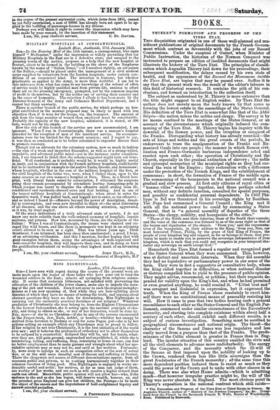MILITARY HOSPITALS AT CONSTANTINOPLE.
.Lesketh How, Ambleside, 17th January 1855.
San—In the Evening Hail of the 12th instant, a correspondent, who signs himself " Medicastor' " under the impression so widely prevailing that our Military Hospitals in the East are in a defective state, and unequal to the pressing wants of the service, proposes as a help that the new hospital at Scutari, about to be formed in the building on the shore of the Bosphorus known by-the name of "Sultan Tenai,"—if I recollect rightly, an old palace of the Sultan,—should be placed under the management of a civil medical corps supplied by volunteers from the London hospitals, under certain con- ditions of an economical kind. The intention is humane, but whether practicable as applied to the Army, is more than doubtful. I am led to this inference from what has come to my knowledge of the refusal of offers of service made by highly qualified men from private life, anxious to afford their aid on the pressing emergency, prompted, not by the common impulse of profit to themselves, but by the nobler one of serving their country and in the cause of humanity. The rejection I allude to has been made by the Director-General of the Army and Ordnance Medical Department, and I cannot but think unwisely.
There is another branch of the public service, for which perhaps an hos- pital established in the manner proposed may be likely to meet with less
abjection than if it were for the troops, viz, the transport. The amount of "(,, from the large number of vessels thus employed must be considerable. Probably the capacity of the new hospital, estimated, it is stated, at 500 beds, would not be too ample.
How the sick of this branch of the service are now accommodated, I am ignorant. When I was in Constantinople, there was a seaman's hospital intended for the reception of men of the merchant service. Its accommo- dations were far too limited for the present occasion; and I regret to say, it was then so conducted as to be better calculated to engender disease than to promote recovery.
Though not an advocate for the voluntary system, now so much in fashion ...-the sign of a weak and imperfect Executive, as well as of a strong-willed, impulsive, and advanced public mind—yet in the instance under considera- tion, I am disposed to think that the scheme suggested might turn out bene- teiaL Well conducted, as it probably would be it would be highly useful -in itself, and in conjunction with the French military- hospitals, could hardly fail babe instructive by example to the native Turks, Greeks, and Armenians; whose hospitals, whether in the ease of the military hospital of the first, or the civil hospitals of the latter two, were, when I visited them, open to the flame censure as our own seamen's hospital at Pere. Thus in a Greek hos- pital, with liberal funds raised by subscription, I witnessed the surgeons rang their rounds accompanied by attendants leaving fumigating-pots in which juniper was burnt to disguise the offensive smell arising from ill- conditioned and carelessly-dressed sores and foul bedding. And in one of the largest military hospitals at Constantinople, when about to enter the dysenteric ward, I was pulled back, and begged not to enter, as too offensive : and so indeed I found it—offensive beyond the power of description, dread- ful to contemplate, and even now dreadful to think of—the most distressing of all diseases, and the one above all others needing attention, aggravated, as it was, by cruel neglect. Of the many indications of a truly advanced state of society, I do not know any more reliable than the well-ordered economy of hospitals, lunatic asylums, and prisons. How low, measured by these, are the subjects of the Sultan! When I was at Constantinople, the insane were chained and en- caged like wild beasts, and like them (a menagerie was kept in an adjoining court) allowed to be seen as a sight. That was fifteen years ago. Their treatment, I am informed, has been since then ameliorated ; a proof, I hope, of an advancing civilization. And this I mention, further hoping that with , good examples before them seeing the advantages of well-organized and well-eared-for hospitals, they will improve their own, and in doing so have 'the gratification attendant on welldoing—that highest mark of an advancing people.
Inspector-General.of Hospitals, H.P


























 Previous page
Previous page